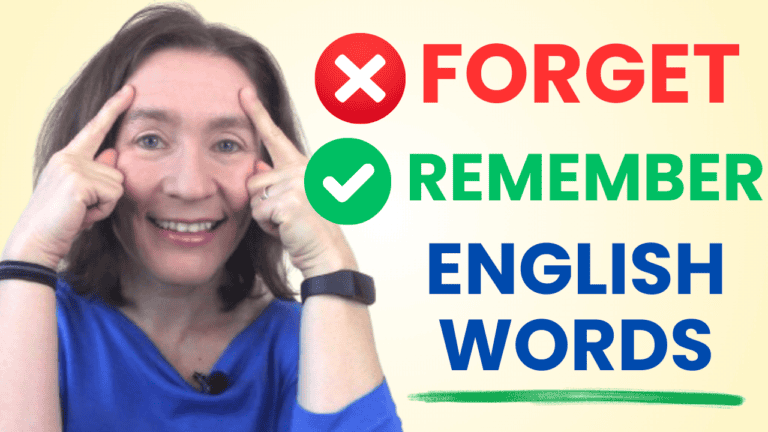
Advanced Vocabulary & Collocations
Do you ever notice that we use the word “said” a lot? He said this, she said that, then I said something else. Now there’s nothing wrong with the word “said,” it’s perfectly fine – but the English language has TONS of other options.
Today we’re going to learn 40 alternatives to “said” – and as you will see, each one adds some extra meaning describing the way the person said something, or the reason they spoke.
If you want to expand your vocabulary beyond basic words, then you’ll love my Advanced Vocabulary and Collocations Course. The lessons inside teach you more than 1000 high-level words to help take your English vocabulary from “simple” to “sophisticated.” One student described it as “like a gold mine for my vocabulary.” Click below for more information and to join:
OK, now let’s look at some different words we can use to describe people talking or saying something. We’ll start with some simple ones, and then move on to verbs that have additional meaning.
mention / comment / remark / state
- He said that he used to be a piano teacher.
- He mentioned/commented/remarked/stated that he used to be a piano teacher.
All of these are basically alternatives to “He said.”
Mention is often used when someone just talks briefly about something, they don’t talk in detail about the topic. And state is often used for somewhat more official things, like when someone on trial states that they are innocent of a crime, or a politician states his/her position on an issue.
add / answer / reply / respond / reiterate
These verbs all provide some information about context of a conversation.
If we answer, reply, or respond, then we are saying something in reaction to another person’s question or statement:
- I asked her if she’d ever been to Mexico; she replied that she hadn’t.
To add means to provide additional information, either to your own previously-mentioned point or to someone else’s point:
- Brian described the environmental benefits of the new law, and Melissa added that it would also reduce costs.
- I told the interviewer about my experience as a writer, and then added that I’d also received several awards for my stories.
To reiterate is similar to the verb “to repeat” – it means to say something again; sometimes using the same words and sometimes using different phrasing.
- The supervisor of the factory reiterated that safety was the primary concern.
ramble / rant / go on and on
These verbs mean that someone is talking excessively about a topic:
- My son spent the whole car ride rambling about his favorite superheroes.
- Our boss went on and on about the importance of customer satisfaction.
recite / rattle off
These are used when someone says something (or a list of things) that they have memorized:
- The lawyer recited the text of the law without needing to check her notes.
- He’s a big fan of Star Wars and can rattle off the names of all the movies.
claim / swear / maintain / insist / stress / emphasize
To claim something means to say it is true (sometimes in situations where someone is doubting that) – and to swear that something is true is adding extra force to your claim.
If other people question you or doubt you, then you might maintain or insist that it’s true – keeping to your position over time, or repeatedly. You might stress / emphasize (give extra importance to) some of the best evidence.
insinuate / imply / hint
These words are used for saying things indirectly. For example, if someone is talking about how unhappy he is with his current girlfriend, he might insinuate / imply / hint that he’s planning to break up with her soon. He doesn’t say it specifically, but you can “read between the lines” and understand it.
blurt / reveal / confess / point out
These verbs all have to do with giving information. To blurt or blurt out means to say something spontaneously without really thinking about it beforehand.
To reveal means to say some information that was previously hidden/secret – for example, She revealed that the company knew about the defective products but didn’t do anything.
To confess means to reveal you did something wrong, or say something to which other people might react negatively:
- She confessed that she’d stolen the money.
- He confessed that he didn’t really like his mother’s cooking.
And to point out simply means to say an observation:
- I pointed out that the paint we bought was a slightly different color than the paint already on the walls.
Next we have some words that have to do with the tone or way of talking, as well as the emotion when speaking.
rant / gripe / hiss / snap / retort
To gripe means to complain, and to rant means to talk a lot in an angry way. These verbs are usually followed by “about”:
- She ranted about how unfair it was that she had to work overtime without extra pay.
- Stop griping about all the work you have to do, and just get started!
To hiss means to say something angrily in a soft voice, like an aggressive snake:
- The people sitting in front of us in the movie theater turned around and hissed, “Shut up!”
Snap and retort both mean to say something in a quick and angry way, usually when we’re in a bad mood or in response to someone else’s insult:
- I asked my wife what time dinner would be ready, and she snapped that she hadn’t had time to prepare anything.
- He was making fun of his sister’s job as a house cleaner, and she retorted that his job as an administrative assistant wasn’t exactly glamorous, either.
gush / joke / exclaim
To gush about something means to say lots of extremely good things about it, because you really love it or you think it’s great. When we joke about a topic, we say things about it that are supposed to be funny, not taking it too seriously.
To exclaim means to say something in surprise – this could be a good or bad surprise:
- My boss exclaimed that this was the best work he’d ever seen.
- “Ugh, this hotel room is filthy!” we exclaimed when we arrived.
advise / caution / warn / beg / implore / press / urge
These words are used for saying things to try to influence someone else’s behavior. Advise is used for giving general advice, and caution/warn are used for alerting someone to danger:
- I advised him to send a cover letter with his resume.
- They cautioned/warned me not to go into that bad neighborhood at night.
To beg/implore someone to do something means to ask persistently with a lot of emotion:
- He begged her to forgive him after he cheated on her.
- We implored the teacher to give us more time to finish the project.
To press/urge someone refers to applying strong pressure:
- We need to make a decision – the other company has been pressing us for a response all week.
- I urged her not to give up on her musical career, because she has real talent.
Now you know a great variety of words to describe different ways of talking and reasons for saying something. And if you’d really like to take your vocabulary up to the next level, I’d encourage you to join my Advanced Vocabulary and Collocations Course.
For now, why don’t you try using a few of the words from today’s lesson in your own sentences? That’s a great way to establish them better in your memory. Thanks for watching and I’ll talk to you next time!











